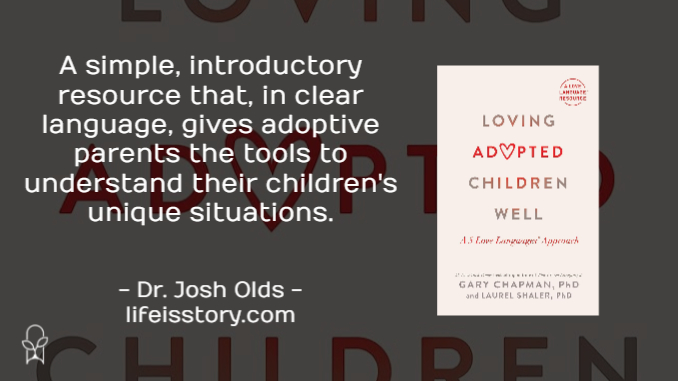
Also by this author: Holding on to Love After You've Lost a Baby: The 5 Love Languages for Grieving Parents, The 5 Apology Languages: The Secret to Healthy Relationships, Loving Adopted Children Well: A 5 Love Languages® Approach
Published by Moody Publishers on February 6, 2024
Genres: Non-Fiction, Adoption
Buy on Amazon
Goodreads

Based on Chapman’s best-selling The 5 Love Languages®—a specialized resource of intentional love for families of adopted children.
Adoption brings unique challenges. Love and bonding don’t always come naturally. There can be emotional distress, frustration, and disappointment. In Loving Adopted Children Well, Dr. Gary Chapman along with professor and mom of adopted kids Dr. Laurel Shaler share how The 5 Love Languages® provide concrete steps to infusing love, hope, and attachment in your family.
In addition to the beauty and healing you’ll discover in the chapters on the love languages—Service, Gifts, Physical Touch, Quality Time, and Words of Affirmation—the authors provide essential chapters on subjects such as:
When You Don’t “Feel the Love”
Getting Spouses on the Same Page
Help for Single Parents
Stopping Sibling Rivalry
Support—Why it’s Needed and Where to Find It . . . and more.With empathy for adoptive parents, Chapman and Shaler provide an honest and invaluable resource of wisdom, joy, and healing. Apply the lessons from Loving Adopted Children Well, and you will see love grow and flourish in your home.
In 1992, a Baptist pastor named Gary Chapman published a book called The Five Love Languages and a revolution was born. In the thirty years since, the concept of a “love language” has become almost ubiquitous within Christian culture and even flowed over into the civil culture at large. Chapman’s original book was a marriage resource, but people began to ask whether or not this concept could be applied to other relationships. A whole host of books would follow with coauthors utilizing Chapman’s framework to apply within their expert contexts.
The latest book in the 5 Love Languages series is Loving Adopted Children Well, coauthored with Laurel Shaler. Dr. Shaler is a certified counselor, marriage and family therapist, and social worker who also teaches in the Department of Counselor Education and Family Studies at Liberty University. And most importantly for this book, she is the adoptive parent of two children who has used her expertise and the Love Language paradigm to guide her own parenting.
If you’ve read any of these books, the structure should be familiar: there are a few chapters of introduction and context-setting, a chapter for each of the five love languages (acts of service, gifts, physical touch, quality time, and words of affirmation), then closing chapters addressing unique needs for the book’s specific audience. In a way, it’s formulaic—and if you’re familiar with the Love Language system, then some of this will be repetitious—but if offers a complete resource for everyone without any need to consult other books or have prior knowledge.
Shaler deftly weaves between telling her own story, engaging with vignettes from adoptive families, and speaking from her own clinical expertise. The result is a book that offers personal and professional insight over a range of adoptive circumstances ensuring that every adoptive family sees themselves in this book.
One of the most important things that Loving Adopted Children Well does is acknowledge that adoption is traumatic and based in the loss of what should be. Adoption creates disrupted attachment and, whether the adopted person is a baby or a teenager, work must be done to foster secure and healthy attachments. Adoption is hard and there are unique circumstances to adoption that may change how we work out the love languages.
An example that Shaler gives of this is the love language of gift-giving. An adoptive parent might think that gift-giving is their child’s love language when the truth is that their previous living situations have taught them to hoard resources because they might not have consistent access to necessities. She writes about being careful about physical touch, given that some adoptive children will not have developed an understanding of displaying appropriate affection or that children coming from abusive backgrounds may be resistant of physical touch.
In all the love languages, the overriding theme is to be aware of and considerate of your child’s traumatic past and slowly and patiently work with them to get to a place of wholeness and healing. The vignettes in the book help build solidarity, telling adoptive parents that they are not alone in the process. Loving Adopted Children Well is a simple, introductory resource that, in clear language, gives adoptive parents the tools to understand their child’s unique situations and ensure that the love expressed for them is expressed in a way that gets through and is felt in all fullness.
